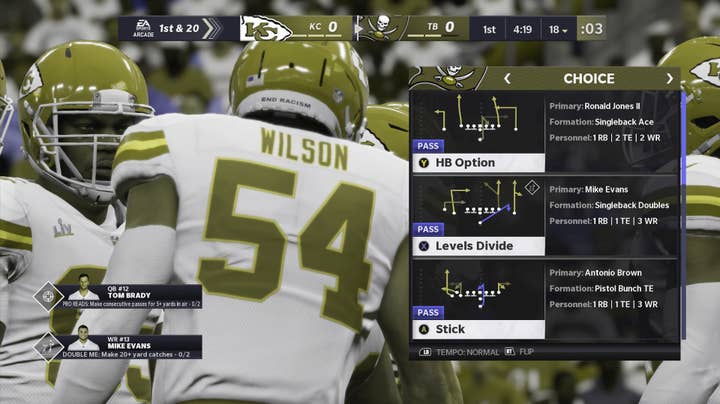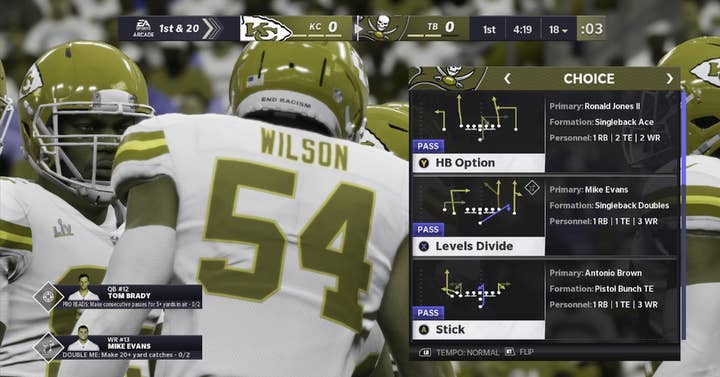The industry should follow EA in using patents to defend accessibility | Opinion
Software patents are a controversial topic but employed defensively, they can help to protect essential accessibility features from the chilling effects of a flawed system
Most stories related to software patents and the games industry have a certain Sword of Damocles feel to them: thus far, at least, their implied threat has been far more significant than their actual impact.
High-profile instances like the patenting of Shadow of Mordor's "Nemesis" system have been more notable for the conversations they have sparked about slippery slopes than for the actual restraints they have placed on other developers -- but the whole topic of these kinds of patents remains a controversial one, both within the games industry and beyond.
It's a rare and unusual day, then, when we get a pretty unambiguously good-news story about software patents. Electronic Arts' announcement this week that it will be opening up five of its patents related to accessibility features, making them freely available to anyone who wishes to implement them and providing a legal guarantee to that effect, is just such a story. Coinciding with the opening of the Paralympic Games, the announcement is a timely boost to recent efforts on the part of many different companies across the industry to make games more accessible to all -- breaking down barriers for players with various forms of disability who, taken cumulatively, represent as much as 15% of the population.
It should go without saying that techniques for making games accessible for disabled players should never be locked up behind a patent barrier
It should go without saying that no matter what your stance is on software patent issues more broadly, techniques for making games accessible for disabled players -- whether they're related to control layouts and options, colour and sound adaptations, or features to add in-game cues and functions -- should never be locked up behind a patent barrier.
One of the major criticisms of the existing patent regime is that it creates a chilling effect; patents and their enforceability are often unclear, and companies often choose to avoid using a certain technique even if the patent which describes it is likely invalid simply because they don't want to get embroiled in a legal fight over the issue.
This is an especially significant issue if the patent is held by a patent troll company, whose entire raison d'être is making those legal fights as costly and drawn-out as possible in the hopes that even companies with legitimate claims will give up and pay a settlement. The possibility of patents describing ways to make games more accessible to disabled consumers ending up trapped in that kind of situation is an especially grim prospect.
What EA is doing here is essentially heading off that prospect -- at least to some extent -- by employing software patents in a defensive way. The company has undertaken to file and register a set of patents it never plans to enforce, and has bound itself legally to that pledge -- a move which essentially protects these techniques from patent trolls and other malicious actors. This is an aspect of the patent system that's often overlooked in the -- largely negative -- discussions about software patents: companies often feel obliged to protect themselves and even their industries more broadly by filing patents for defensive reasons, and while the depiction of companies greedily trying to lock up innovations behind licenses isn't always unfair, it's often far from the mark.

Needless to say, this is an imperfect system -- companies shouldn't have to file patents for techniques they have no intention of profiting from just in order to ward off expensive legal battles with trolls and rent-seeking parasites -- but in terms of working within the realities of that system, what EA is doing makes perfect sense. Working within the system to get the best possible outcome is important, and doesn't have to be mutually exclusive with criticising that same system and arguing for worthwhile and lasting reform.
What's important now is that other companies in the industry follow EA's lead, and make this approach -- providing free access to patents related to accessibility, or indeed to any other technique upon which the industry relies and which could see harm done by patent trolls -- into simply a default behaviour for companies in this sector.
The trend towards accessibility has been a very welcome one, and while the embrace of accessibility as a virtue has been uneven, many major companies have made major steps in recent years. Creating an industry-wide set of openly available patents for accessibility techniques would help to lock in some of those gains and achievements.
Even beyond simply being the right thing to do, this step would be commercially beneficial -- 15% of the addressable market live with a disability of some kind, and countless others enjoy and benefit from these features and the flexibility they offer to players of all kinds. Despite the loud noises made by a tiny minority who whinge about making games "easy" with some of these functions, accessibility features seem to be incredibly popular with the majority of consumers, both disabled and otherwise.
The next step beyond EA's initiative -- which is in itself an excellent, well-intentioned and carefully thought-out move -- ought to be for a repository or network of openly available software patents to evolve beyond the good intentions of individual publishers, becoming a more secure and long-term repository held in an industry-funded non-profit organisation. Working to set up something like this between various publishers and developers -- either as a new body or through the auspices of existing industry bodies like the ESA, IGDA and UKIE -- would allow the creation of a stable and trustworthy curator to which publishers "donate" patents with value for accessibility, ensuring that this becomes standard practice and is well-protected in the long term.
In an ideal world, such a body might help to allay broader fears about the software patents Sword of Damocles which many developers worry is hovering somewhere above their heads. Until a more permanent solution to the question of software patents and the legal uncertainty they introduce to the industry can be found, however, at the very least we can work to ensure that accessibility features are held apart from those disputes and protected from the chilling effects of the existing and deeply flawed software patents system.

